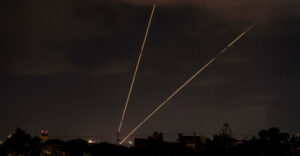Iran has warned that it will target “all infrastructure” in Israel if it faces retaliation for the missile attack it carried out yesterday, Tuesday, stated the head of Iran’s General Staff, General Mohammad Bagheri.
“If the Zionist regime, which has gone mad, is not controlled by its American and European supporters and seeks to continue its crimes or act against our sovereignty and territorial integrity, a response like last night’s (yesterday’s) will occur again, with even greater intensity,” General Bagheri warned via Iranian state television, adding that “all infrastructure” would be targeted.
Watch what people on the ground saw when Iran attacked Israel
— Sky News (@SkyNews) October 1, 2024
Latest: https://t.co/7SBkHNPCv2 pic.twitter.com/HN3sn3ZAOd
Attack with 200 Missiles
Iran’s armed forces launched 200 missiles against Israel during the attack on Tuesday night, including – for the first time – hypersonic missiles, according to Iranian state television today.
The Islamic Revolutionary Guard Corps, an elite branch of the Iranian military, claimed that “90%” of the missiles hit their targets. In contrast, the Israeli military reported that Iran launched around 180 missiles toward Israeli territory, most of which were intercepted and destroyed.
Footage from earlier tonight showing several Iranian Long-Range Ballistic Missiles striking Tel Nof Airbase to the Southeast of Tel Aviv; with a Majority of Israeli Aircraft at the Base, including Two Squadrons of F-15C/D “Eagle” Multirole Fighters, said to have been in the Air… pic.twitter.com/wfs2kLFwHc
— OSINTdefender (@sentdefender) October 1, 2024
In June 2023, Iran unveiled a medium-range hypersonic ballistic missile, named Fattah, capable of moving at fifteen times the speed of sound. Iranian President Ebrahim Raisi said at the time that this weapon would boost the Islamic Republic’s “deterrent power” and bring more “peace and stability” to the region.
Hypersonic missiles are highly maneuverable and can fly at low altitudes, making their trajectory difficult to predict and challenging to intercept.
The U.S. and Israel Discuss Retaliation
The U.S. government warned Iran yesterday, Tuesday, of the “consequences” of its attack on Israel, while holding talks with Prime Minister Benjamin Netanyahu’s government on how to respond.
“The U.S. fully, fully, fully supports Israel,” said President Joe Biden to the press, confirming ongoing discussions with the Israeli government about retaliation.
National Security Advisor Jake Sullivan noted that President Biden believed the attack was “ineffective” and had been “repelled” by Israeli forces, with support from the U.S. and other allies.
Secretary of State Antony Blinken condemned the Iranian attack, stating it was “completely unacceptable” and called on the global community to denounce it.
As the Middle East remains in a highly volatile state, calls for a ceasefire in Lebanon and Gaza continue to go unanswered. Pentagon spokesperson Pat Ryder indicated that Iran launched “about twice as many missiles” compared to a previous attack in April.
#BREAKING
— Tehran Times (@TehranTimes79) October 1, 2024
The moment when the Commander-in-Chief of IRGC announced the code of Operation True Promise II. pic.twitter.com/Bnr5mpBtQR
Washington reported no Israeli casualties but is seeking information regarding the death of a Palestinian citizen in Jericho, in the occupied West Bank. National Security Advisor Sullivan called Iran’s actions a “significant escalation” and emphasized the importance of consultation with Israel.
Earlier, the White House announced that President Biden had ordered the U.S. military to “assist Israel in its defense” and confirmed the interception of missiles launched against the U.S.’ close ally, similar to the assistance provided during the April 13 missile and drone strikes by Iran.
Both President Biden and Vice President Kamala Harris monitored developments from the White House crisis management room.
The U.S. insists on coordinating with Israel regarding the response to the attack. “This attack will certainly have consequences for Iran. I won’t elaborate on those today, but we will coordinate with our Israeli counterparts,” said State Department spokesman Matthew Miller. He also refuted claims that Tehran had informed Washington of the attack in advance.
“This is completely false. The Iranian government did not warn us of any such attack,” Mr. Miller stated, countering circulating rumors. He emphasized that while Tehran did not “telegraph” this attack like in April, Washington had “indications” that Iran was planning to launch ballistic missiles against Israel.
Ask me anything
Explore related questions





